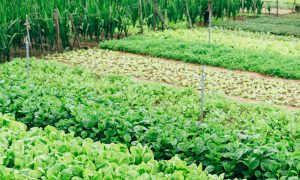Agro-ecology entails cultivation methods, water management, consistent avoidance of artificial fertilizers and pesticides, no concentrated feed and only antibiotics based on medicinal plants for farm animals. As broad and complex as the subject of agroecology is, the goal is for farmers to use what is available at low cost in such a way that man and nature benefit equally.

THE Morogoro-based Sokoine University of Agriculture (SUA) has embarked on a special mission project geared at upgrading and accelerate agro-ecological farming systems among the farmers and extension officers across the country, taking on board Mbeya, Morogoro and Singida regions as its pilot centres.
Agroecology is the science and practice of applying ecological concepts and principles to the study, design and management of sustainable food systems.
It is the cultivation methods, water management, consistent avoidance of artificial fertilizers and pesticides, no concentrated feed and only antibiotics based on medicinal plants for farm animals. As broad and complex as the subject of agroecology is, the goal is for farmers to use what is available at low cost in such a way that man and nature benefit equally.
Dubbed ‘Agro-ecology Hub in Tanzania’ (AEHT) the project undertakes gender-sensitive and multi-stakeholder collaborative research for development of agro-ecological friendly policies for enhanced livelihoods and sustainable environment in rural communities through principles of Agro-ecological Intensification (AEI) in Tanzania.
AEHT is a collaborative crop research program funded by the McKnight Foundation, in partnership with other vital partners including SUA, Nelson Mandela African Institution of Science and Technology (NM-MAIST), Agricultural Non State Actors Forum (ANSAF), Sustainable Agriculture Tanzania (SAT), Regional Corridor Development Authority (RECODA), Swissaid Tanzania, Tanzania Organic Agriculture Movement (TOAM), Tanzania Alliance for Biodiversity (TABIO) as well as Local Government Authorities (LGAs).
AEHT’s principal investigator, Professor Dismas Mwaseba, who doubles as the agriculture extension and community development at SUA, told Go! Tanzania in an exclusive interview that the project was also based on several other packages to ensure smooth stakeholder participation in advocacy and lobbying for Agro-ecology friendly policies, strategies and practices, and capacity building through honing relevant agro-ecology experts.
“Through the hub, we’re training agro-ecological experts to the tune of Master of Science Degrees and doctoral programs in agro-ecology as well as short courses, and exchange programmes for farmer’s research networks and extension staff,” he expressed.
Giving further details, the Don expressed that the hub was also responsible for compilation of documents and disseminate information on the best practices and technologies based on research of agro-ecology and related fields.
However, sharing the experience so far from the center pertaining to development of the agro-ecology sector in Tanzania, Prof. Mwaseba observed that participation and support from farmers and local leaders in activities requiring their involvement is still limited.
“We have also experienced that strong and well established famers research networks are highly required for effective on-farm research, whereby often, policy makers invited to organized meetings/forums to discuss policy issues don’t turn up, the negative move which weakens performance of the vital agriculture sub-sector,” he acknowledged, adding that there’s a need for effective coordination of agro-ecology stakeholders in the country.
He further explained that the movement was now working on to ensure agro-ecology was inserted in the training curricula of the local agricultural institute by the government through the ministry of agriculture so as to ensure the helpful farming system is being adopted by many farmers.
The professor observed the presence of a poor market of agro-ecology produced from Tanzania, the situation which calls for timely and collective interventions, from both, public and private sector.
“Agro-ecological Intensification has the potential to contribute to sustainable food systems in Tanzania. However, this requires various stakeholders to join hands and address various relevant issues critical for the enhancement of AEI in the country,” he emphasized.
The practice of agro-ecology can as well transform agricultural production in the country as well as mitigating effects of climate change.
Best example of agro-ecology practices includes conservation tillage, mixing crops in a single plot (intercropping and poly-cultures), crop rotation, cover crops and mulching, crop-livestock integration, integrated nutrient management, biological management, efficient water management, manipulation of vegetation structure as well as afro forestry.



